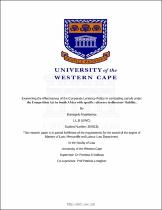Examining the effectiveness of the Corporate Leniency Policy in combating cartels under the Competition Act in South Africa with specific reference to directors’ liability.
Abstract
The economy is harmed by the behaviour of a director that engages in anticompetitive behaviour in the sense that consumers may suffer the economic consequences in the form of having lesser buying power. This restricts healthy economic growth, drive up prices and reduce innovation and investment. Section 73A of the competition Amendment Act introduces the criminalization of cartel conduct and will hold directors/managers criminally liable for infringing s4 (1) (b) of the Competition Act. Section 4(1) (b) specifically prohibits firms from engaging in price-fixing, collusive tendering, market allocation which are regarded as egregious forms of activity. It is for this reason that this study investigates whether directors can be held personally liable for engaging in cartel activities and the effectiveness of the Corporate Leniency Policy which incentives cartel members to self-report in order to obtain immunity from competition law prosecution.

